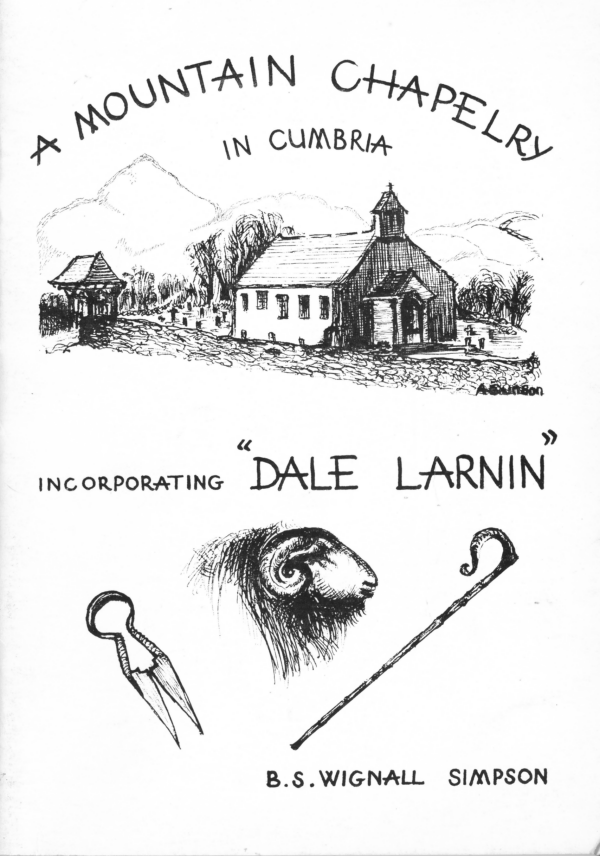A
Mountain Chapelry - Ulpha

This pamphlet is basically a reprint of the original issue printed in 1934 to commemorate the restoration of the Church by the late Mr. H. L. Hicks, F.R.I.B.A., of Newcastle-on-Tyne.
The original pamphlet was reprinted in 1950, but the only alterations from the original were the inclusion of the photographs of the three Clergyman, each of a type outstanding in his own way, together with one or two additional details to bring the reading matter up to date.
In this edition ` Dale Larnin', written in 1944 and revised in 1956, has been incorporated. As much of `A Mountain Chapelry' was repeated in `Dale Larnin', the matter common to both has been omitted from `A Mountain Chapelry'.
A.G.P. 1974
PREFACE
The thought of a brief history of the Parish of Ulpha was first conceived at the time of the restoration of the Church in 1934. Then again, the numerous changes which have taken place within the last few years, the removal by death of many "old stagers," and the dying out of several families, together with the absence in the youth of our age of that interest in the place in which they and their fathers have lived, which was formerly such a characteristic of the countryman, all contribute to the necessity of the setting down of certain bits of old lore which are in danger of being lost.
I am indebted to many of the older inhabitants who have submitted to be catechised on many points, and also to those who have supplied the photos in the work.
It is my earnest hope that Parishioners and friends will derive pleasure and amusement from the following pages.
B.S. W. S.
I.
THE PARISH of Ulpha is 13,000 acres in extent, and consists of all the land on the west bank of the River Duddon, from its source at the top of Wrye Nose, near Three Shire Stones, down as far as Logan Beck, the stream which can be seen coming down behind Duddon Hall, the large yellow-coloured house in the valley. The River Duddon also used to form the boundary between the counties of Cumberland and Lancaster.
The name "Ulpha" is founded in old writings as "Woolfhay," Uffay or Ouffa. It is generally held to be derived from Ulf's "hough" or "how," meaning Ulf's Manor. The land was granted to Uif, son of Evard, shortly after the Norman Conquest; and his posterity enjoyed it until the time of Henry III. Later it passed into the hands of the Lords of Millom—the Boyvills and Huddlestons. The latter family owned Duddon Hall and worked the furnace in the wood a little lower down the valley, at a point to which ships in those days could approach by sailing up the river.
Though several old writers refer to the wildness and rugged nature of the valley, and until quite recently its roads proved too much for many motorists, it was, nevertheless, a real hive of industry. Men had to make what they needed, or do without it. Stone was quarried for building; lead was mined, and sent away in rough carts; and the felling and burning of wood for charcoal provided further employment. The introduction of the water wheel caused the establishing of a Corn Mill and a Bobbin Mill. Every house had its hand loom for weaving. The only fuel consisted of peat and wood. Lighting was supplied by rush lights, reeds dipped in fat, preferably goose grease, which was run into stone moulds chiselled out of the hearthstone. These holes can be seen in several farmouses today. To conserve herbage, cattle and sheep which were not needed for breeding were driven to market in autumn, and everyone, in town and country alike, laid in a supply of salted meat. In many houses one can see the roof of the living room, or house, just in front of the fireplace, has been raised a foot or more. This was to provide room for hanging pieces of mutton to be smoked. Many old people tell of the time when fresh meat was only seen on special occasions, generally a funeral. Butter was, and is, salted when it is plentiful, and reserved for the winter season. Salmon was found in abundance in the pools of the river. These were speared, taken out, killed and salted in barrels. This practice continued up to within living memory.
This short summary of the occupations of the old dalesmen, one hopes, will serve to dispel the popular illusion that life was one long monotonous task of trying to keep body and soul together. Life was hard and men had to scrat and scrap, but it was filled with change and variety, for each new season brought its hopes, its special task, its success and its disappointments. Men had to be adaptable and resourceful as well as strong; and those who had these qualities, and were fairly lucky, rarely failed to have a long stocking hidden in a hollowed-out kitchen beam.